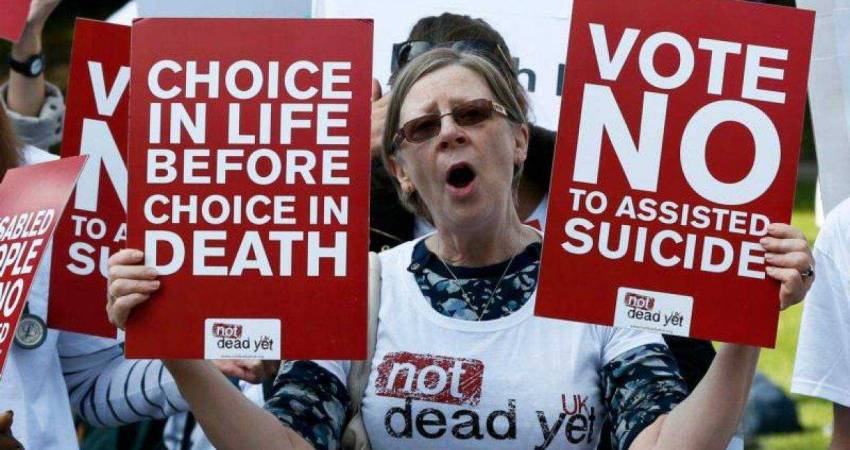
PR: Rejection of 'dangerous' Assisted Suicide Bill welcomed
The Life Institute has welcomed the decision of the Oireachtas Justice Committee to comprehensively reject a bill seeking to legalise Assisted Suicide.
The Oireachtas Justice Committee said the Bill has “serious technical issues” and that it lacked safeguards to protect against undue pressure being put on vulnerable people to avail of assisted dying.
They also said that the “serious flaws” and the fact that the “gravity of such a topic as assisted dying warrants a more thorough examination” meant that the Dying with Dignity Bill 2020 should not proceed to Committee stage, but should be passed to a Special Committee of the Oireachtas.
Welcoming the rejection of the Bill, Niamh Uí Bhriain of the Life Institute said that the bill had been adamantly opposed by most medical professional bodies and especially by palliative care experts as being drafted without safeguards and being seriously flawed.
She said that the bill would have endangered seriously ill or elderly people, and would lead to vulnerable people being placed under undue pressure to end their own lives.
The Justice Committee said that the majority of submissions from all categories of medical stakeholders opposed the bill.
The Committee also noted that “A point that was repeated frequently throughout submissions in all categories was concern that this Bill could result in abuse of the sick and vulnerable, who may perceive themselves to be a burden on their family and feel pressured into opting for assisted dying.”
It reported that “some 324 submissions were sent in from those affiliated with the Life Institute, an organisation which is pro-life, pro-family and believes in the sanctity of human life. They strongly oppose this Bill. Among the points raised in their submissions, additional to the points raised in other categories include: that assisted suicide is strongly resisted by disability rights groups for the clear impact it would have on devaluing the lives of those with disabilities and the risks it poses to them.”
It also referred to the Life Institute's inclusion of the section of the High court ruling in Marie Fleming v Ireland, which gave a damning judgement regarding the perceived difficulties of ensuring that safeguards adequately protect the vulnerable members of society under assisted dying legislation, stating that: "even with the most rigorous systems of legislative checks and safeguards, it would be impossible to ensure that the aged, the disabled, the poor, the unwanted, the rejected, the lonely, the impulsive, the financially compromised and emotionally vulnerable would not avail of this option to avoid a sense of being a burden to their family and society".
Life Institute also pointed out that "increased pressures on national healthcare budgets, which were struggling to provide resources for long term care and global trends towards ageing populations in certain areas of the world ,create a risk that assisted dying would be used as a solution and a cheaper alternative for end of-life healthcare provision, at the expense of increasing investment in palliative care and other end-of-life services.
"They quote a recent paper published in The Canadian Medical Association Journal, which they state claimed that millions of dollars could be saved in health care spending by ‘assisting’ people to die. Similarly, a Canadian budget report allegedly stated that $149 million could be "saved" on the annual cost of end-of-life care by utilising assisted suicide," the Committe said.
Nearly all the 36 submissions from stakeholders focusing on mental health issues and palliative care category stated their opposition to the proposed Bill or raised their doubts and concerns over elements contained within the Bill.
In the category of individual medical submissions, the Committee received 64 submissions, the majority of which were also opposed to this Bill, focusing on the dangers of a slippery slope, and highlighting the recent governmental decision in the Netherlands (which had previously been approved in Belgium in 2014), which would allow for assisted dying to include children suffering from a terminal illness.
"Several stakeholders objected to the title of the Bill. They believed that it undermines the work of palliative organisations by implying that assisted dying is the better or the only way to have dignity when dying. Thus, they argued that it should be changed to ‘Assisted Dying’ to more accurately reflect the intentions behind the Bill and to represent that palliative care also provides a dignified death,” the committee noted.
“Many stakeholders in this category had experience working in a palliative capacity and believed in the significant benefits of good palliative care and pain management, which they believe provide a sufficient alternative to ease a patient’s suffering from a terminal illness.”
Life Institute said that investing in palliative care and significantly improved supports for terminally ill people and those with severe illness was a more compassionate and progressive answer than Assisted Suicide.
Featured
- Man jailed for 9 years for forced abortion
- Abortion coercion has arrived in Ireland – the NWC are silent
- Review of at-home abortions 'needed after coercion case'
- French Govt to remind 29-year-olds of biological clock
- Huge factor in decline in primary school numbers ignored
- Germany Denies Promoting Abortion Abroad—While Funding Pro-Abortion NGOs
- Govt don’t oppose Coppinger abortion bill at 1st stage
- March for Life: Vance, the White House, and a Divided Pro-Life Movement
- Paris’ Annual March for Life Puts Euthanasia in the Spotlight
- Britain’s seemingly limitless abortion rate
- The importance of the work carried out by Every Life Counts
- Puerto Rico officially recognizes unborn children as ‘natural persons’
- Assisted suicide laws stalled by “complex” legal issues
- Yes, that hideous celebration of 300 abortions is real
- White Crosses Memorial: Dungarvan once again pays its respects to our aborted babies
- Josiah: Abortion Survivor
- Rally for Life 2025
You can make a difference.
DONATE TODAY